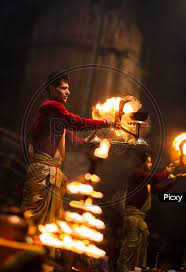Harathi : An Important Part In Traditional Hindu Worship
Harathi : Also Known As Mangala Aarti is an important part of traditional Hindu worship. It is performed after the completion of the puja (ritual worship) of each deity, where camphor is used to offer the Aarti. During the Aarti, the elders present usually sing Mangala Aarti songs specific to the respective deities. In some cases, Aarti is also performed for humans, such as during weddings or birthdays, with the intention of bringing joy and happiness to them.
The purpose of Harati in Pooja, also known as Neerajanam, is to offer light to the deity. This is done by lighting a lamp or lamps, or by using camphor, in front of the idol. Music is often played during the Aarti, and devotees participate by singing songs or bhajans. After the Aarti, the Harati is shown to the eyes. In ancient times, when there was limited lighting, the form of the deity was not clearly visible. The Harati served as a means for devotees to see the image of God more clearly and receive blessings. This may be one of the reasons why the tradition of Harati holds such importance.
There are various traditions and rituals associated with giving Aarti using neti sticks. Different numbers of sticks, ranging from one to twenty, are used in counting. Mantrapushpam pooja is performed after the Aarti.
Harathi & In North India
In North India, the song “Jayajagadeesha Hare” is commonly used in almost all pujas, and the same tune is used for different deities. In the South, the style of Harati is more varied, and songs and hymns ending with the word “Mangalam” are often sung.
The tradition of Tarigonda Vengamamba, a devotee who lived in Tirumala, where the chariot would not move until she took Harathi, became established as a service. This service is known as Tarigonda Mutyala Harathi. The descendants of Vengamamba continue this tradition to this day.
Also Read : Altha : Also Known As Parani For Legs A Cherished & Cheerful Telugu Tradition

